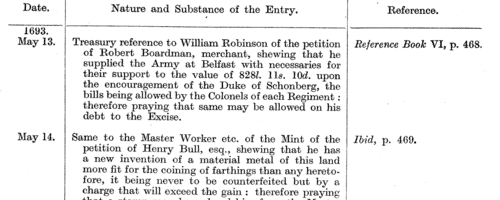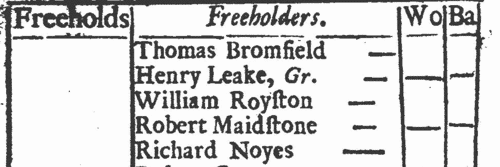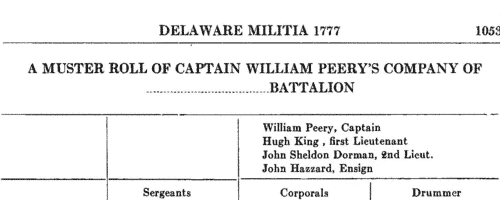Jennet Surname Ancestry ResultsOur indexes 1000-1999 include entries for the spelling 'jennet'. In the period you have requested, we have the following 13 records (displaying 1 to 10): Buy all | | | Get all 13 records to view, to save and print for £72.00 |
These sample scans are from the original record. You will get scans of the full pages or articles where the surname you searched for has been found. Your web browser may prevent the sample windows from opening; in this case please change your browser settings to allow pop-up windows from this site. Tenants of Somerset chantries
(1548)
Chantries were established to perform services for the souls of their founders and other faithful dead, including annual obits and anniversaries at which alms were usually distributed. The chantries could be at an existing altar in a parish church, a new altar in a side chapel of an existing church, in a new chapel in the churchyard or some miles from an existing church: few were founded before 1300, and most date from 1450 to 1500. Hospitals were places provided by similar foundations to receive the poor and weak; there were also religious guilds, brotherhoods and fraternities, and colleges (like large chantries at which three or more secular priests lived in common). An Act of Parliament of 1545 gave king Henry VIII the power to dissolve such chantries, chapels, &c., the proceeds to be devoted to the expenses of the wars in France and Scotland. Commissioners were appointed 14 February 1546 to survey the chantries and seize their property, and in 1548 the commissioners in Somerset produced this survey and rental. The individuals named are the tenants whose rents provided the chantry's income: occasionally an incumbent is named. The survey was edited by Emanuel Green for the Somerset Record Society, and published in 1888.JENNET. Cost: £4.00.  | Sample scan, click to enlarge

| Scottish litigants, rebels and cautioners
(1569-1578)
The Privy Council of Scotland exercised a superior judicial authority in the kingdom, and consequently received and dealt with a constant stream of petitions, as well as dealing with the internal security of the state. This register of the council from July 1569 to June 1578, in the reign of king James VI, was edited by John Hill Burton, Historiographer Royal for Scotland, and published under the direction of the Lord Clerk Register of Scotland in 1878. Some of the individuals mentioned are the complainants, those of whom they complained, and the sureties on both sides: at this period, some of the complainants are alleging serious attacks, often of a feuding nature. Many of the bonds entered into by the cautioners are promises to keep the peace towards such enemies. Failure to answer to the council when summoned was a serious contempt, leading to being denounced a rebel, with serious consequences. But 'horning' was also used in the pursuit of debts: there was no imprisonment for debt in Scotland, but a creditor could have an obstinate debtor ordered, in the sovereign's name, to pay what was due, failing which, the debtor could be put to the horn, denounced as a rebel, and imprisoned as a rebel.
JENNET. Cost: £4.00.  | Sample scan, click to enlarge

| Secretary of State's Papers
(1600)
The letters and papers of sir Robert Cecil, Secretary of State, deal with all manner of government business in England, Ireland and abroad.JENNET. Cost: £4.00.  | Sample scan, click to enlarge

| PCC Probate Abstracts
(1630-1634)
The Prerogative Court of Canterbury's main jurisdiction was central and southern England and Wales, as well as over sailors &c dying abroad: these brief abstracts usually give address, date of probate and name of executor or administrator
JENNET. Cost: £2.00.  | Sample scan, click to enlarge

| Treasury Books
(1693-1696)
Records of the Treasury administration in Britain, America and the colonies, from January 1693 to March 1696. These also include records of the appointment and replacement of customs officers such as tide waiters and surveyors. The calendar was prepared by William A. Shaw for the Lords Commissioners of His Majesty's Treasury and published in 1935, from letters patent, privy seals, royal sign manuals and warrants, treasury warrants, commissions, orders, letters, memorials, reports and other entries, all not of the nature of Treasury Minutes. JENNET. Cost: £4.00.  | Sample scan, click to enlarge

| Freeholders of Covent Garden
(1705)
This 'Exact List of the Poll At the Chusing of Knights of the Shire for the County of Middlesex, Taken at New-Brentford, on Monday the 28th of May, 1705' lists all the freeholders eligible to vote, parish by parish, with an indication on the righthand side whether each voted for Sir John Wolstenholme, baronet, (Wo) or Score Barker, esquire, (Ba), or not at all. Those qualified to vote were men of full age (over 21) in possession of a freehold estate worth 40s a year or more.JENNET. Cost: £6.00.  | Sample scan, click to enlarge

|  Masters of Apprentices registered at Warwick
(1750-1754) Masters of Apprentices registered at Warwick
(1750-1754)
Apprenticeship indentures and clerks' articles were subject to a 6d or 12d per pound stamp duty: the registers of the payments usually give the master's trade, address, and occupation, and the apprentice's name, as well as details of the date and length of the apprenticeship. There are central registers for collections of the stamp duty in London, as well as returns from collectors in the provinces. These collectors generally received duty just from their own county, but sometimes from further afield. (The sample entry shown on this scan is taken from a Norfolk return)JENNET. Cost: £8.00.  | Sample scan, click to enlarge

|  Apprentices
(1761) Apprentices
(1761)
Apprenticeship indentures and clerks' articles were subject to a 6d or 12d per pound stamp duty: the registers of the payments usually give the master's trade, address, and occupation, and the apprentice's name, as well as details of the date and length of the apprenticeship. 1 January to 21 July 1761.JENNET. Cost: £8.00.  | Sample scan, click to enlarge

| Delaware Militia (1778)
Muster rolls of the Delaware state militia.
JENNET. Cost: £8.00.  | Sample scan, click to enlarge

|  Masters of clerks and apprentices
(1786) Masters of clerks and apprentices
(1786)
Apprenticeship indentures and clerks' articles were subject to a 6d or 12d per pound stamp duty: the registers of the payments usually give the master's trade, address, and occupation, and the apprentice's name, as well as details of the date and length of the apprenticeship. 10 February to 31 December 1786. IR 1/33JENNET. Cost: £8.00.  | Sample scan, click to enlarge

|
| 1 | 2 |  |
Research your ancestry, family history, genealogy and one-name study by direct access to original records and archives indexed by surname.
|













